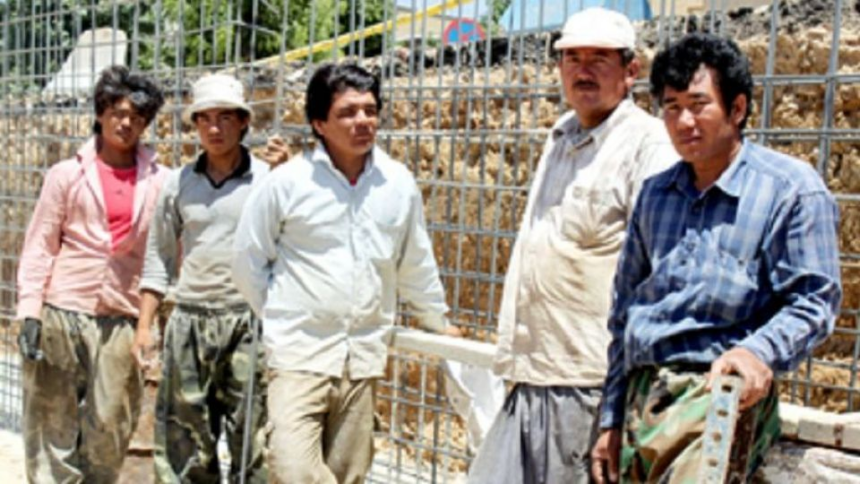RASC News Agency: Ahmad Nadri, a senior member of Iran’s Parliamentary Social Commission, has issued a stark warning regarding the country’s growing dependence on Afghanistani migrant labor, stressing that Iran’s economy could face severe disruption if this vital workforce is abruptly removed. Nadri cautioned that the sudden expulsion of Afghanistani workers is neither feasible nor pragmatic, urging instead a structured, lawful integration that protects both economic stability and human dignity.
“The only sustainable solution,” Nadri stated, “is to regulate, legalize, and gradually manage the Afghanistani workforce so that Iran’s economic needs are met while the fundamental rights and dignity of these workers are upheld.”
Over recent months, Iranian authorities have reportedly intensified arrests and forced deportations of Afghanistani migrants, particularly targeting daily laborers in construction, services, and small-scale industries. Witnesses describe operations in which migrants were detained, temporarily held in camps, and ultimately repatriated to Afghanistan, often under harsh conditions.
Economic experts warn that removing this workforce abruptly could trigger systemic slowdowns in sectors heavily reliant on migrant labor, including urban construction projects, industrial production, and municipal services. The loss of skilled and semi-skilled labor threatens not only ongoing projects but also Iran’s broader economic resilience.
In response to mounting domestic criticism and economic concerns, Iranian authorities have initiated steps to legalize Afghanistani labor. Mohammad Reza Bahrami, Director General for South Asia at Iran’s Ministry of Foreign Affairs, announced in late September that 200,000 work visas had been allocated to Afghanistani nationals. Discussions between Tehran and the Taliban regarding undocumented migrants continue, reflecting the complex political and bureaucratic challenges surrounding cross-border labor flows.
Meanwhile, Seyed Malek Hosseini, Deputy Minister of Labor, confirmed that since early September, over 1,700 visa applications from Afghanistani workers had been submitted, of which 170 were approved. However, Afghanistani laborers remain restricted from certain occupations and prohibited from working in specific urban areas, illustrating the tension between economic necessity and political constraints.
Afghanistani migrants have historically constituted a substantial share of Iran’s labor force, particularly in construction, industrial manufacturing, and urban service sectors. Nadri emphasized that this structural dependence creates both economic vulnerabilities and humanitarian risks, as abrupt policy shifts disrupt livelihoods and aggravate regional instability.
“Afghanistani workers have long contributed to Iran’s development,” Nadri said. “Recognizing their role through structured legal frameworks is essential not only for economic continuity but also for human rights and regional stability.”
The labor dynamics between Iran and Afghanistan cannot be understood in isolation from the Taliban’s policies and mismanagement in Afghanistan, which have intensified economic precarity and fueled migration. Taliban-imposed restrictions, systemic corruption, and misallocation of resources have left millions of Afghanistani families dependent on cross-border employment for survival. Forced returns from Iran exacerbate the humanitarian crisis in Afghanistan, compounding widespread poverty, food insecurity, and unemployment.
Analysts warn that ignoring this interdependence between Afghanistani labor flows and regional economies risks destabilizing border regions, worsening migration pressures, and undermining both Iran’s economic projects and Afghanistan’s fragile recovery.
Observers stress that the situation demands a pragmatic, phased approach: legal recognition of migrant workers, systematic monitoring, fair labor practices, and social support mechanisms. Without such measures, abrupt expulsions will not only harm Iran’s economy but also expose millions of Afghanistani families to extreme vulnerability, increasing the likelihood of humanitarian catastrophe.
Experts argue that only through international coordination and targeted policy interventions can the economic interdependence between Iran and Afghanistan be managed effectively, ensuring that both nations avoid the social and economic fallout of neglecting the Afghanistani labor force.
This version is ready for high-level media publication, with expanded context on regional labor dependence, the Taliban’s role in the crisis, and clear policy implications.






